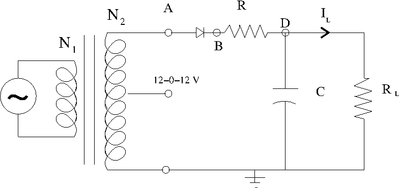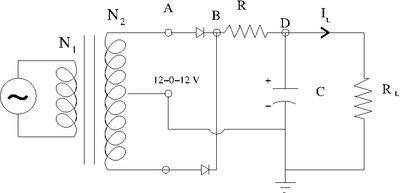Difference between revisions of "Lab 10 RS"
| Line 24: | Line 24: | ||
The output ripple can be found by <math>\Delta V=\frac{I\Delta t}{C}</math> | The output ripple can be found by <math>\Delta V=\frac{I\Delta t}{C}</math> | ||
| − | Taking | + | Taking AC signal from outlet equals to <math>60\ Hz</math> my input pulse width is <math>\Delta t = 17\ ms</math> and using say <math>C = 2.2\ uF</math> to make <math>\Delta\ V \ll 1\ V</math> I need my current to be: |
| − | <math>I \ | + | <math>I \ll \frac{1\ V \cdot 2.2\ uF}{17\ mA} \ll 0.129\ mA</math> |
Revision as of 06:37, 8 March 2011
Lab 10 Unregulated power supply
Use a transformer for the experiment.
here is a description of the transformer.
File:TF EIM 241 transformer.pdf
Half-Wave Rectifier Circuit
1.)Consider building circuit below.
Determine the components needed in order to make the output ripple have a less than 1 Volt.
The output ripple can be found by
Taking AC signal from outlet equals to my input pulse width is and using say to make I need my current to be:
The output ripple can be found by
I have used the following components and input parameters:
and the following input parameters:
The current through the circuit can be found as
where
.
And the current becomes
So my output ripple becomes
List the components below and show your instructor the output observed on the scope and sketch it below.
Full-Wave Rectifier Circuit
Determine the components needed in order to make the above circuit's output ripple have a less than 0.5 Volt.
List the components below and show your instructor the output observed on the scope and sketch it below.
Go Back to All Lab Reports Forest_Electronic_Instrumentation_and_Measurement

